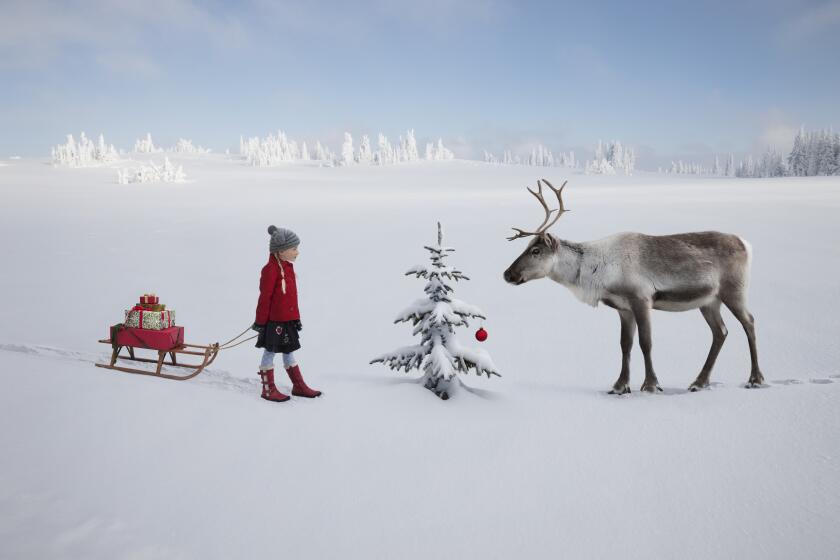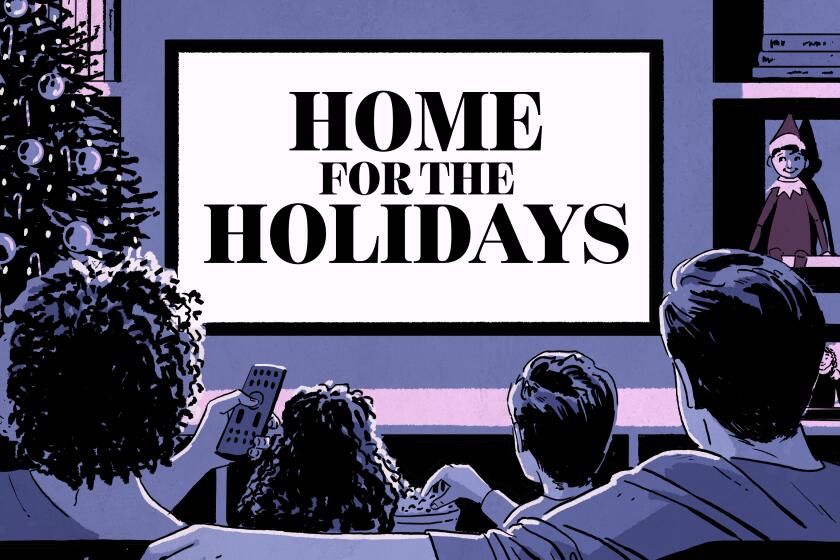Holiday TV wants to ignore COVID-19. The alternate reality is an insult to viewers
- Share via
Dr. Seuss’ “How the Grinch Stole Christmas” was given a new — and much-maligned — musical reboot last week on NBC. Consistent with the beloved fable, which has delighted fans young and old for more than six decades, the grumpy Grinch, played by Matthew Morrison, glared at the festive residents of Whoville, vowing to do his best to “keep Christmas from coming.”
This year, “The Grinch” has competition: Turn on CNN, MSNBC or other news channels during the dinner hour, and there are plenty of signs that ‘tis not the season to be jolly.
The COVID-19 pandemic continues to wreak havoc throughout the U.S., with record numbers of cases, hospitalizations and deaths. Many Californians are under new stay-at-home orders, and a wave of similar restrictions has come to communities across the country. Unemployment claims are once again on the rise and countless business owners have had to shut their doors. Amid the raging novel coronavirus outbreak, anger over the killing of young Black men by police led to nationwide protests. And the encouraging pledges by President-elect Joe Biden to unite the country are being drowned out by President Trump and the Republican Party’s relentless campaign to overturn the election results.
But make it a few more clicks down the dial, and you’ll discover that Christmas has arrived on schedule, with not a single wreath or Nutcracker out of place. In the massive parade of holiday-themed movies on Hallmark, Lifetime and other networks, this year’s darkest season remains as bright as ever.
The once-overlooked genre has become a lucrative cottage industry — and sparked competition for seasonal viewers. Call it the Christmas movie wars.
“A Godwink Christmas: Meant for Love” sees Kathie Lee Gifford instruct a large group of family and friends to “grab your cocoa and warm up your vocal cords” as they venture out into the night for neighborhood caroling. In “The Santa Squad,” a beautiful, unemployed teacher melts the heart of a wealthy, straitlaced widower as she teaches him and his adorable young daughters the true meaning of Christmas. “A Little Christmas Charm” finds an investigative reporter and a jewelry designer joining forces to track down the owner of a Christmas charm. “A Very Charming Christmas Town” witnesses an online journalist fall in love while doing a story on Solvang, “the most Christmas-y town in the U.S.A.”
The nation’s woes are absent in this torrent of cheerful content, which started in late October and will continue unabated until Christmas. The best known presenters of the lighter-than-air fare have been joined by places from Hulu and BET to, yes, Fox Nation, broadcasting generic, glossy stories starring TV favorites such as Candace Cameron Bure and Lacey Chabert, as well as lesser-known — but always photogenic — performers. Elaborate production designs guarantee that every frame of the movies contains a Christmas tree, an ornament, a Santa or some other joyful symbol of the holidays.
Christmas movies have become a cottage industry in recent years because they’re immensely popular (and thus lucrative), offering reliable escapism in picture-perfect settings where the celebration of Christmas cures all ills — grief, loneliness, financial difficulties, family estrangement. If the struggling family farm is in danger of being sold to big-city developers if the family doesn’t come up with enough cash by Christmas Eve, as in Lifetime’s “Christmas a la Mode,” viewers can rest assured that a Christmas miracle will arrive just in time.
These films have always been set in an alternate reality that has nothing to do with the real world or the anxiety, depression, even despair experienced by scores of people during the holidays. But in 2020 — widely regarded as one of the worst years in modern American history — these movies’ commitment to making merry at all costs seems especially out of touch, not least because the pandemic has killed so many (more than 300,000 in the U.S. to date) and made it impossible for a significant number of families to say goodbye to their loved ones in person.
After all, these movies don’t air in a vacuum. They’re interrupted by ads, many of which do acknowledge the difficulty of this year. And for families whose gift-wrapping or tree-trimming celebrations — on hold because of the pandemic — often include a screening of seasonal favorites, these ostensibly uplifting titles are as liable to be a painful reminder of better times as they are a respite from bad ones.
Los Angeles Times TV critic Robert Lloyd imagines the plots of the season’s holiday TV movies based on their titles alone.
Whether and how much we need a distraction from this dire winter is debatable. So is the question of whether movies filmed this year under restrictions of social distancing and mask wearing bear a responsibility to acknowledge reality in their narratives, however obliquely. But ultimately, there is little upside in denial.
My heart broke recently during an interview with “Good Day L.A.” anchor Michaela Pereira, whose usually cheerful disposition broke as she choked up about not being able to visit her parents in Canada this year because of the virus. CNN anchor Chris Cuomo’s voice shook last week as he read letters to Santa Claus from kids saying they would rather have a cure for COVID-19 than toys under the tree.
Christmas projects produced since the start of the pandemic had an opportunity their competitors didn’t to hint at the fact that this year is different, whatever we may wish, and it would have been a sign of respect for their viewers. Facing the truth does not mean eliminating perennial messages of faith, hope and gratitude: If anything, 2020 has heightened the importance of those values for many, not lessened it.
It would certainly catch the attention of my good friend Claudia Vaughn, a project manager at UCLA’s Cancer Center who loves Christmas. Every holiday season, she wears holiday pins, puts a wreath on the door of her apartment and wears gaily colored sweaters throughout December.
But she hates TV Christmas movies.
“Ugh,” she responded when I told her that I had spent several hours bouncing among Christmas movies. “They’re all cheesy, and they’re all the same.”
After a public outcry last year when it pulled an ad featuring a same-sex wedding, Hallmark Channel is back with its first holiday movie featuring a gay couple.
She then laid out what she thought would be a good movie: “A large family gets together over Zoom for a holiday party, but there’s one person, the loudest one, complaining how they want to see the grandparents, how the whole virus thing is just nonsense. He leaves the party for another one, gets infected and winds up in the hospital. Some nurse brings him an iPad in bed, where he can see the rest of the family over Zoom, wishing him good wishes and to please get well. And he realizes what an idiot he’s been, but that his family still loves him. Now that’s a movie I would watch.”
A commercial for a flower delivery company that aired during one of the aforementioned movies illustrates similar possibilities: A grandmother is clearly unhappy when her young granddaughter can send holiday greetings only on the iPad. But her neighbors have dropped a bouquet of flowers on her front porch, and she smiles warmly as they serenade her from the sidewalk and nearby houses with a socially distanced version of “Silent Night.”
Change is achievable: After years of being blasted for slates of movies that were predominantly white and straight, Hallmark, Lifetime and others have made diversity much more visible this season, particularly with Black casts. Lifetime’s “A Sugar & Spice Holiday” showcased a predominantly Asian cast. Gay couples finally broke through, featured in Lifetime’s “The Christmas Setup” and Hallmark’s “The Christmas House.”
And during these tumultuous times, the presentation of alternate realities in pop culture has become more — well, unrealistic. After resisting calls for a Black lead for much of its 18-year run, “The Bachelor” franchise introduced its second Black lead, Bachelorette Tayshia Adams, this fall — and produced an unexpected, emotional discussion between Adams and suitor Ivan Hall, who is Black, about their feelings on the Black Lives Matter movement. The frank and candid talk, which prompted tears from Adams, was out of character with the show’s usually rosy presentation. And guess what? The franchise didn’t crumble. Instead of being alienated, Bachelor Nation overwhelmingly praised the intimate exchange.
The introduction of real life into the Christmas movies would likely produce the same result: Just look at Dolly Parton’s CBS special, “A Holly Dolly Christmas,” which featured the American icon and COVID-19 vaccine funder performing new original songs as well as Dolly-ized versions of Christmas favorites like “I Saw Mommy Kissing Santa Claus.”
The country music star is everywhere these days. And she’s determined to bridge our seemingly countless divides.
The special was spare, without an audience, celebrity guests or costume changes, and only one church-like set, with stained-glass windows and candles. Parton spent much of the time sitting as she sang, flanked only by her band and background singers.
Standing in front of a small, racially mixed choir at the end of the show, Parton explained how the special had been done “safely from our home area of Nashville. We’re smart about testing, wearing a mask and social distancing. It’s not a big Hollywood production show, I’m sure you noticed.”
She then wished viewers a Merry Christmas, “no matter how limited it will be this year. Wishing for a better New Year like I’m sure you are, because Lordy, this year couldn’t get any crazier, could it? I guess it could, but I hope it don’t. With the virus, the weather, the election? Whew! I don’t know what to make of that.”
Parton then introduced a new song she wrote, “I Still Believe,” inspired by faith, hope and charity — “which is exactly what we need right now.” The lyrics include, “Even though we’re walking through the valley of death, scared and wondering what happens next, uncertainty, division, anger and unrest, I still believe.”
The song and its references to “the strange and angry times we’re living in” led to its rousing chorus: “I believe in my very core that we’ll walk again in the sunshine by the seashore.” Those words moved me more deeply than any story from any of this year’s countless Christmas movies. Because, unlike forced cheer, they were true.
2020: Just sayin’ — the year doesn’t automatically bring to mind happy thoughts as we head into the home stretch.
More to Read
The complete guide to home viewing
Get Screen Gab for everything about the TV shows and streaming movies everyone’s talking about.
You may occasionally receive promotional content from the Los Angeles Times.









